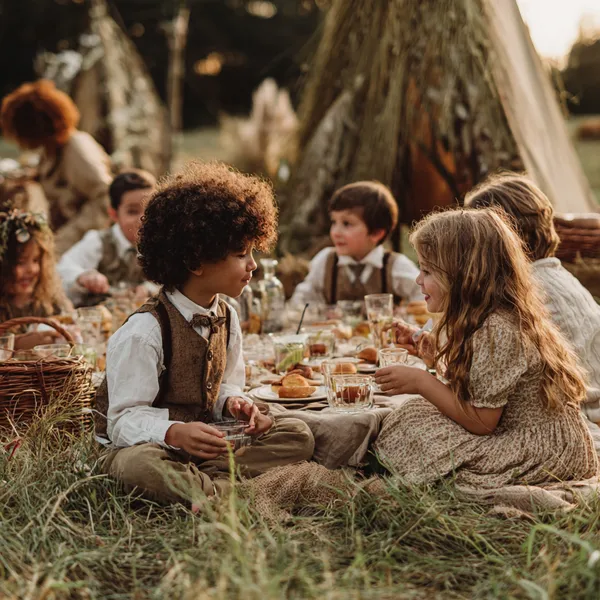So I'm standing in the middle of our VBS disaster last summer and everything that could go wrong is going wrong.
Craft supplies never got delivered. Sound system's making weird screeching noises. Three volunteers called in sick. Two kids are crying because they can't find their parents. One kid threw up on the snack table.
And I'm thinking "this is fine, everything's fine" while internally having a complete meltdown.
That's when Sarah walks up and goes "You look like you're about to lose it. What can I do to help?"
Turned out Sarah had been watching me run around like a headless chicken for twenty minutes while obvious solutions were right there. I was just too panicked to see them.
Made me realize most event disasters aren't because of things going wrong. They're because of how you react when things go wrong.
Which happens every single time no matter how much you plan.
Have Backup Plans for Your Backup Plans
First year doing VBS I planned everything perfectly. Every detail mapped out. Every supply counted. Every volunteer assigned a specific job.
Then morning of the first day our main craft volunteer gets stomach flu. Suddenly we've got a hundred kids showing up and nobody knows how to do the craft.
Complete panic mode.
Now I have backup plans for everything. Who can step in if someone's sick? What's a simpler version if the elaborate activity doesn't work? Where's the closest store if we run out of supplies?
Not because I expect disasters but because they always happen anyway.
Last month Tom couldn't make it to an event he was supposed to lead. Instead of freaking out I already had Jessica ready to step in. Kids didn't even notice anything was different.
Start Setup Way Earlier Than You Think
Used to start setting up like an hour before the event thinking that was plenty of time.
Wrong. Everything takes twice as long as you expect.
Tables are heavier than you remember. Extension cords are never long enough. Decorations look terrible when you actually put them up.
Now I start setup the day before if possible. At least three hours before if same day.
Gives time to fix things that don't work instead of frantically trying to solve problems while families are arriving.
Also means volunteers aren't stressed trying to finish setup while managing kids at the same time.
Don't Try to Control Everything Yourself
My natural instinct is to handle everything myself because then I know it's done right.
Terrible strategy for events with lots of moving parts.
Learned to delegate specific areas to specific people. Tom handles setup. Sarah manages registration. Jessica coordinates volunteers. Mike deals with technical stuff.
Gives me freedom to float around solving problems instead of being stuck doing one job while other things fall apart.
Also means other people feel ownership instead of just following my orders.
When our Easter event sound system died, Mike had it fixed in five minutes because he knew exactly how everything was connected. Would've taken me twenty minutes of panicked guessing.
Have More Volunteers Than You Think You Need
Always feels wasteful having extra volunteers who might not have much to do.
But when crisis hits you'll be so grateful for extra hands.
Had a volunteer get injured during event setup. If we'd only had the minimum number of people we would've been screwed. Since we had extras we could cover her responsibilities without anyone being overwhelmed.
Extra volunteers can also handle unexpected things. Kid gets sick and needs to go home? Someone walks them to parents. Registration line gets backed up? Someone jumps in to help.
Better to have too many helpers than not enough when things get crazy.
Know Where Everything Is
Sounds obvious but in the middle of event chaos you forget where you put basic stuff.
Make a list of where supplies are stored. Where the first aid kit is. Where extra batteries are. Where contact numbers are.
Share this info with key volunteers so you're not the only person who knows anything.
Had a kid fall and scrape their knee during an outdoor event. Volunteer asked where bandaids were and I had no clue. Spent ten minutes looking while the kid cried instead of fixing the problem immediately.
Now I make sure at least three people know where emergency supplies are.
Plan for More Kids Than Expected
Registration says fifty kids. Better plan for seventy.
Kids bring friends. Siblings show up unexpectedly. Families forget to register but come anyway.
Having extra supplies and space saves you from scrambling last minute.
Did a harvest festival expecting forty kids. Sixty showed up. Ran out of craft supplies by the second station. Had to improvise activities using random stuff from the supply closet.
Not fun but taught me to always over-prepare for attendance.
Have Simple Activities Ready as Backup
Elaborate activities are great when they work. When they don't you need something simple to fill time.
Keep basic supplies on hand. Coloring pages. Simple games. Stories you can tell without prep.
Our science experiment activity was a complete failure because supplies didn't work right. Instead of panicking I switched to charades which kids loved just as much.
Simple backup activities often end up being more popular than complicated planned ones anyway.
Designate a Problem Solver
Choose one person whose job is floating around looking for issues and solving them.
This person doesn't run a specific activity. They just troubleshoot whatever comes up.
Kid can't find parent? Problem solver helps. Craft station runs out of glue? Problem solver finds more. Volunteer needs a break? Problem solver covers.
Keeps small problems from becoming big disasters because someone's watching for them.
Communicate Way More Than Feels Necessary
Volunteers need to know what's happening even if it seems obvious to you.
"Craft time ends in ten minutes, start cleaning up." "Registration table running behind, send overflow to game area." "Sound check in five minutes, everyone be quiet."
Over-communication prevents confusion and keeps everyone on the same page.
Had a volunteer keep sending kids to the bathroom one at a time because she didn't know there was a backup bathroom available. Created a huge line and frustrated families.
Would've been avoided if I'd told all volunteers about both bathroom locations.
End on a High Note Even If Event Was a Disaster
Kids remember how things end more than how they started.
If an event was rough but you finish with something fun and positive, families go home happy.
Our Christmas party was a series of small disasters. Cookies burned. Game prizes ran out. Craft activity was too complicated.
But we ended with everyone singing Christmas carols together and families said it was a wonderful time.
Sometimes a good ending can save a mediocre event.
Planning Big Events Like VBS
When planning major events like Vacation Bible School, all these principles matter even more because the scale is bigger and more things can go wrong.
Found RETREAT: JUST LIKE YOU recently - complete event curriculum designed with backup plans and flexible options built in. Type of resource that helps you prepare for chaos instead of pretending everything will go perfectly.
What I've Learned About Events
Things will go wrong no matter how much you plan. That's not failure, that's just reality.
Your reaction to problems matters more than the problems themselves.
Volunteers and families are usually understanding if you're honest about challenges instead of pretending everything's perfect.
Simple events often work better than elaborate ones because fewer things can break.
Kids have way more fun when adults aren't stressed about making everything perfect.
Relationships matter more than perfect execution.
Why Events Are Worth the Stress
Families get to know each other outside Sunday morning rush.
Kids see church as a fun place instead of just an obligation.
Volunteers work together toward a common goal which builds the team.
Creates memories that last way longer than individual Sunday school lessons.
Shows community that church cares about families, not just individual souls.
Builds foundation for deeper relationships during hard times.
Planning Next Events
Keeping things simpler based on what I've learned.
More volunteers than I think I need.
Backup plans for key activities.
Setup starting way earlier.
Clear communication with everyone involved.
Focus on connection over perfection.
Tom volunteered to be floating problem solver for the next event because he's good at staying calm during chaos.
Sarah wants to coordinate volunteer communication because she's naturally organized.
Jessica offered to handle backup activities because she's creative under pressure.
That's when you know you're building a good team. When people volunteer to help with the hard parts instead of just the fun parts.
Marcus who used to hate church events? Asked if he could help setup next time. Kid who usually complains about everything wanting to be part of making it happen.
That's what good events create. Not perfect execution but people who want to be involved because they feel like they belong.
Worth every moment of stress and chaos when families leave feeling more connected to each other and to the church community.
Watch YouTube
Listen to Podcast








